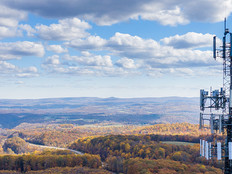Are Mesh Networks the Answer to Open Internet?
The challenges of bringing fiber networks to cities are well documented. Setting up the physical infrastructure alone is a massive undertaking, and that’s just the beginning. Internet service providers need to connect individual homes, and customers must be willing to pay the going rate. Because of the high up-front costs, most communities have few options and are forced to pay high rates for high-speed access.
The Internet is a platform for openness and transparency, but its infrastructure is anything but, according to Clive Thompson on Mother Jones:
The internet may seem amorphous, but it's at heart pretty physical. Its backbone is a huge array of fiber-optic, telephone, and TV cables that carry data from country to country. To gain access, you need someone to connect your house to that backbone. This is what's known as the "last mile" problem, and it's usually solved by large internet service providers such as AT&T and Comcast. They buy access to the backbone and charge you for delivering the signal via telephone wires or cable lines. Most developed nations have plenty of ISPs, but in poor countries and rural areas, the last-mile problem still looms large. If providers don't think there's enough profit in household service, they either don't offer any or do it only at exorbitant rates.
If Internet access is a civil right, as many people suggest, shouldn’t it be operated by the community, not corporations?
Mesh Networking: The People’s Platform
There is an alternative to traditional broadband: mesh networking. A mesh network is made up of a number of devices that connect to one another rather than to a central Internet. The endpoints are known as nodes, and every node can communicate with every other node. If one node goes down, the network can self-heal, which means outages are rare and access is nearly guaranteed.
Because mesh networks are decentralized, they face a different kind of infrastructure problem. They require that a community of people connect to one another. It’s a challenge, but it is enormously valuable when communities can make that connection happen.
Mesh networks are truly wireless, meaning they are functional during natural disasters if traditional infrastructures go offline. Mesh networks are also inexpensive, so underserved communities can gain high-speed access at a low cost. The networks are also anonymous; it’s nearly impossible to track down individuals on a distributed network. The implications for everything from handling disaster recovery to battling dictatorships are impressive, even if they aren’t well known yet.
Most importantly, as noted by Primavera de Filippi on Wired, local networks bring people together:
What’s really revolutionary about mesh networking isn’t the novel use of technology. It’s the fact that it provides a means for people to self-organize into communities and share resources amongst themselves: Mesh networks are operated by the community, for the community.
For instance, in face of the damages caused to Haiti’s communication infrastructure by the 2010 earthquake, the Serval project was launched in Australia with the objective to create a disaster-proof wireless network that relies exclusively on the connectivity of mobile devices.
Meanwhile, after the Egyptian government attempted to shut off the internet in the whole nation, the Open Mesh Project emerge with the goal of providing open and free communications to every citizen in the world regardless of national boundaries.
Finally, there is the Open Technology Institute’s (an initiative of the New America Foundation) Commotion Wireless project. Originally aimed at providing a secure and reliable platform to prevent authoritarian regimes from controlling or blocking dissident or activist communications, it has so far only been deployed in confined areas where the communication infrastructure was either damaged or missing.
As Internet usage becomes more important to the daily lives of people around the world, we will be forced to answer philosophical questions about the Internet: Who owns it? Who controls it? And who decides the price? Expect mesh networks to be an important part of that discussion.









